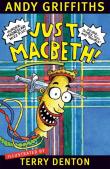 7136833082799797806.jpg
7136833082799797806.jpg
 7136833082799797806.jpg
7136833082799797806.jpg
'Take one Shakespearean tragedy: Macbeth.
'Add Andy, Danny and Lisa - the Just trio, whose madcap exploits have already delighted hundreds of thousands of readers for the last ten years.
'Mix them all together to create one of the most hilarious, most dramatic, moving stories of love, Whizz Fizz, witches, murder and madness, from the bestselling and funniest children's author in Australia.' (From the publisher's website.)
'Historically, literary sources have always provided a rich resource for film narratives, meaning that the history of cinema is closely intertwined with the history of film adaptation. Children’s literature in particular has been a favoured source of represented narratives. Some of the earliest film adaptations were of children’s texts, many of which have been readapted multiple times. Adaptation studies has been a growth area of scholarly research and debate for at least five decades. However, despite the close imbrication of the film industry and children’s literature since the early twentieth century, few adaptation scholars have turned their attention to the rich resource that children’s and youth culture provides. This paper surveys dominant shifts in approaches to adaptation, in particular the shift from ‘fidelity criticism’ to a dialogic intertextual approach; the recent move back to a modified form of ‘fidelity criticism’; and the cultural work that has thus far been achieved in the field of adaptation studies and children’s and youth culture. In doing so it examines the critical challenges faced by scholars in the field and the potent possibilities future scholarship might pursue.'
Source: Edinburgh University Press.
'Just Macbeth! is Shakespeare like I’ve never read him before. It’s raucous and disgusting, immature and absurd. Kings sing karaoke, there is a time-travel potion made from dog saliva, and children plot regicide for Wizz Fizz rewards. What makes Shakespeare’s collection of works timeless is its ability to be reinterpreted across mediums, regardless of era, culture or language. Macbeth is no different, having been famously reworked countless times. But never have I read the script adapted for a younger audience to include fart jokes and bedwetting. Many Australians may have never read anything written by Shakespeare, let alone seen one of his plays. This book aims to persuade children that they should. While it could easily be seen as cringe-worthy toilet humour, there is a method to the madness (note the Hamlet reference) of Just Macbeth!. Andy Griffiths and Terry Denton’s interpretation manages to disguise learning as a good time. A really good time.' (Introduction)
'Just Macbeth! is Shakespeare like I’ve never read him before. It’s raucous and disgusting, immature and absurd. Kings sing karaoke, there is a time-travel potion made from dog saliva, and children plot regicide for Wizz Fizz rewards. What makes Shakespeare’s collection of works timeless is its ability to be reinterpreted across mediums, regardless of era, culture or language. Macbeth is no different, having been famously reworked countless times. But never have I read the script adapted for a younger audience to include fart jokes and bedwetting. Many Australians may have never read anything written by Shakespeare, let alone seen one of his plays. This book aims to persuade children that they should. While it could easily be seen as cringe-worthy toilet humour, there is a method to the madness (note the Hamlet reference) of Just Macbeth!. Andy Griffiths and Terry Denton’s interpretation manages to disguise learning as a good time. A really good time.' (Introduction)
'Historically, literary sources have always provided a rich resource for film narratives, meaning that the history of cinema is closely intertwined with the history of film adaptation. Children’s literature in particular has been a favoured source of represented narratives. Some of the earliest film adaptations were of children’s texts, many of which have been readapted multiple times. Adaptation studies has been a growth area of scholarly research and debate for at least five decades. However, despite the close imbrication of the film industry and children’s literature since the early twentieth century, few adaptation scholars have turned their attention to the rich resource that children’s and youth culture provides. This paper surveys dominant shifts in approaches to adaptation, in particular the shift from ‘fidelity criticism’ to a dialogic intertextual approach; the recent move back to a modified form of ‘fidelity criticism’; and the cultural work that has thus far been achieved in the field of adaptation studies and children’s and youth culture. In doing so it examines the critical challenges faced by scholars in the field and the potent possibilities future scholarship might pursue.'
Source: Edinburgh University Press.